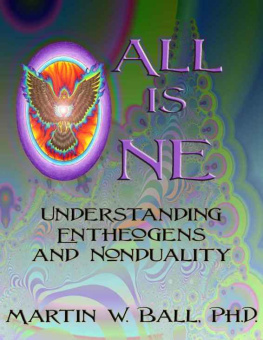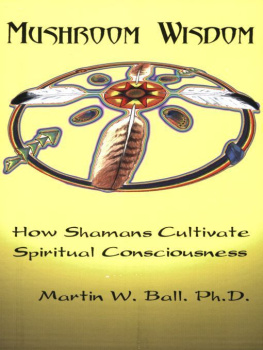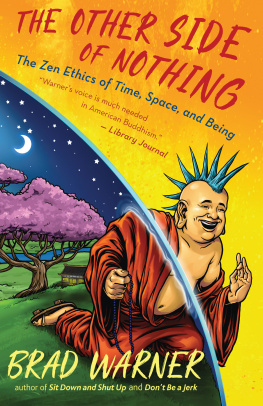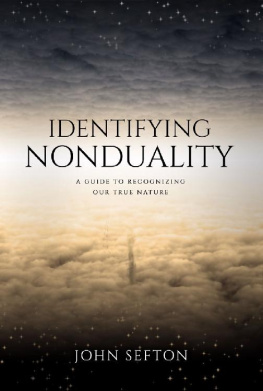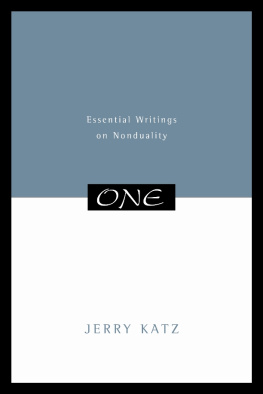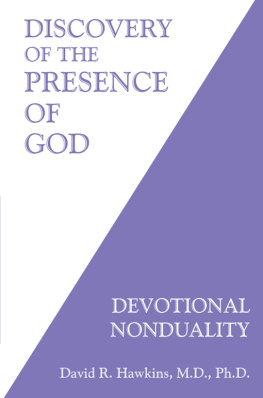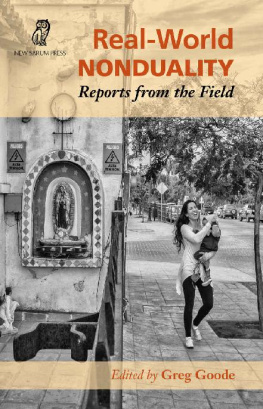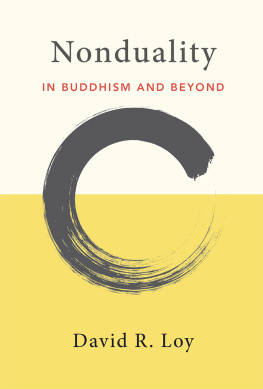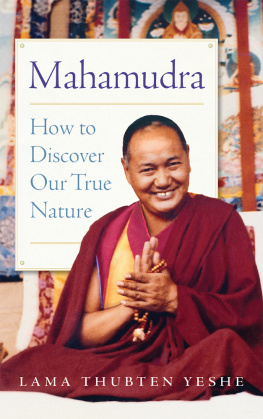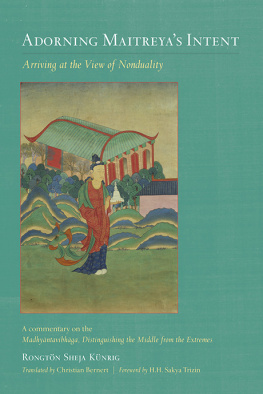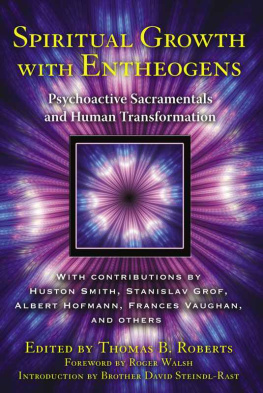All is One
Understanding Entheogens and Nonduality
by
Martin W. Ball, Ph.D.
2012
Martin Ball
Kyandara PublishingISBN: 978-1-105-73714-5
Legal Disclaimer:This work is intended for educational and philosophical purposes. The author is in no wayresponsible for the actions or choices of readers.
Preface
The following is a collection of recent writings of mine pertaining to the topic ofnondualism and entheogens. It is offered here as a mini-ebook as an expression of my personalmeditations and realizations on this most interesting and timely topic. This project was inspiredby a recent request by the editors at Reality Sandwich to put together a mini-ebook for themfollowing up on an interview I formerly published with Rick Strassman about his research onDMT. I quickly put something together for them, and liked the idea of releasing a short ebook somuch that I thought Id put out one on my own. This is the result.
Since my own awakening, and subsequent transformation, through the use of powerfulentheogenic tools in the spring of 2009, Ive found myself continually returning to the topic ofnonduality and the role that entheogens can play in personal awakening and transformation.Prior to my awakening, I had considered myself a spiritual seeker, always on the look-out forwhat might be the truth of being, and willing to consider virtually any propositions about thenature of reality that seemed plausible from my perspective and experience. I was on a hunt fortruth, and was very eager to find it, especially when I hit a point in my life when I admitted tomyself that I wasnt happy, and that it was up to me to do something about it. I took up thechallenge of the deep responsibility to be myself, something I realized I only allowed in limitedand compartmentalized aspects of my life. In many ways, I had sought to conform to what Ithought I should be, and that included my idea of being a spiritual seeker. It is quite achallenge to authentically be yourself when you dont know who or what that self is.
It took a great deal of challenging my ego to come to an authentic understanding ofmyself. When the dam broke, it broke full force, however, and though my ego is still a part ofme, the grip it formerly had on me has been forever shattered. Now, I use my ego as somethingof a social outfit something that facilitates normal interaction with others, but I know fullwell that it isnt me, and I slough it off at the drop of a hat, as situations require. And, becauseIve freed myself from my egos grip, my true energy shifts and flows with dramatic ease andregularity. Ive learned how to go with it, regardless of what my ego may or may not think. Ivediscovered within myself the knowledge I needed to truly be myself, and it wasnt at all what Iexpected or thought it might be like from my study of different spiritual traditions such asBuddhism and shamanism. My own awakening and transformation didnt conform to anything Ihad previously learned or considered a possibility. Needless to say, I was quite surprised, andthe transition wasnt an easy one. But it was fully worth it.
Its a bit of a paradox, knowing what I know now. What Ive learned is fundamentallybeyond what language can communicate, but that doesnt stop me from attempting tocommunicate about it as best, and as often, as I can. While I engage in this activity purportedlyfor the benefit of others, in truth, I do it because its simply what feels authentic to me. I do itbecause I want to. I find pleasure in sharing the truth with anyone who might be searching it out,and the act of expressing myself is its own satisfaction. What people take from what I have toshare is entirely up to them. Its also all I really want to talk or write about at least at the levelof my presentations to the public. The result is that since the spring of 2009, Ive been sayingpretty much the same thing over and over again in different mediums: books, articles, videos,music, interviews, individual counseling, my podcast, my forthcoming novel, Beyond Azara, andnow, this mini-ebook.
It all boils down to the fact that once you know what you have to say, what else is thereto say?
My goal, at this point, is to simply tell it like it is. And I tell it like it is based on whatIve learned within myself. If youre acquainted with my work, especially my post-spring 2009work, most of what is written here will be review, though some of the specific writings willlikely be new to you. If this is your first time reading my conclusions about entheogens andnonduality, well, just relax, dont take it personally, and keep an open mind.I only bite whennecessary.
I hope that the interested reader finds the following collection both illuminating andstimulating. Part I is a new overview of the topic of nonduality, the nature of the ego, and theenergetic actions of entheogens, specifically 5-MeO-DMT, which I regard as the apex ofentheogenic tools. Part II features two selections from my forthcoming novel, Beyond Azara,where Ive taken the ideas described in Part I and illustrated them through fictional narrative.Part III is the product of a whim I had one day a few months back to write an operators manualfor the human vehicle from Gods perspective. Its sharp, but also funny. Life is a game, afterall, so its best to enjoy things with a sense of play. Lastly, I wrap things up with some verseabout awakening sleepwalkers.
Because this is a collection of independently written pieces, there is some overlap andrepetition of ideas from one section to the next.Big ideas are worth repeating, however, andoften require it. Ive arranged the readings in the order that I think is most instructive, but theycan be read in any order.
Enjoy, and good luck!
Martin Ball
-Another version of you!Ashland, Oregon, Spring, 2012
Part I
Nonduality, the Ego, and Entheogens
Introduction:
Throughout the ages, mystics, gurus, and sages have proclaimed, All is One.What,precisely, does this mean? Does that mean that all religions, spiritualities, and belief systems areequally reflective and expressive of universal truth? Are all truths equally valid and worthy ofrespect and acceptance? If not, upon what determinations are some truths to be accepted asgenuinely true and others as false?Or oppositely, are all truths merely conventions, devoid ofany genuine truth-value or validity? And how does one begin to go about addressing thesequestions, and from what perspective? Why is it even relevant to proclaim that All is One?Whats the point?Is saying that All is One just another belief itself, and no more factual thanany other grand statement about the nature of reality? Or is there something genuinely true here,and if so, what is it, and what does it mean for any given individual?
As someone who has accepted the nondual nature of reality, I personally feel that it isworthwhile, and to individuals benefit, to sort out the above, and related, questions. I came towhat might be considered a radically nondual perspective on the nature of reality, not out ofphilosophical study or intellectual discernment, but rather, through direct, immediate andunmediated experiences of the fundamentally unitary nature of reality.My answers to thequestions Ive posed here are therefore personal and reflective of what Ive learned, first andforemost, about myself. However, I also consider the conclusions Ive reached to be universal,for they are nondual, and as such, are conclusions about the nature of the whole, and theindividuals relationship to that whole, and therefore applicable to all perspectives.
In what follows, I will do my best to spell out what the statement All is One both does,and does not, mean. Many of my conclusions may seem surprising to interested readers, as agreat deal of what Ive learned does not agree with many of the claims and views espoused bysupposedly enlightened masters and wisdom traditions. Through my own awakening, andsubsequent transformation, Ive discovered that a great deal of what passes for universal ortranscendent wisdom is more accurately understood as projections and attachments of the ego,though genuinely insightful nuggets are often buried in the dross. For this reason, I have taken toarticulating my own description, which I call The Entheological Paradigm; it is a nondualdescription of the nature of reality as a unified, energetic, conscious system. While it has certainfeatures in common with many wisdom traditions, it disagrees with a number of fundamentalpropositions of virtually any and all traditions, and therefore needs to be addressed as its owndescription that is not derivative of any other tradition or system of nondual wisdom. As aparadigm, what is intended is an exemplary model, as the term paradigm suggests.In beingentheological, it addresses the nature of God as being internal to individual experience ratherthan positing some transcendent, all-powerful being at a dualistic level.

